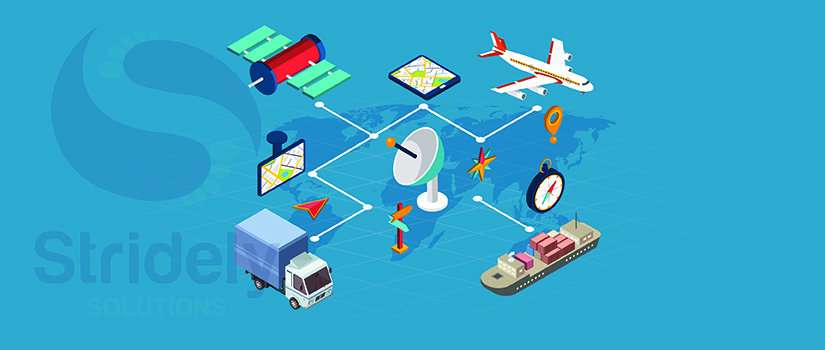The supply chain and logistics industry have been growing for decades. Predicting how and what is nothing but difficult. Given the pace at which technology is rising, organizations, irrespective of their domain, invest in the same. One such disruption has been witnessed by the logistics and the supply chain industry. It is seen that the optimal inception of technologies in the domain of supply chain and logistics own the potential to amplify business growth.
Further, with rising in technological trends, the demands and the expectations of the customer rises and it becomes imperative for the organization to align their business processes with emerging technologies to map the rising needs of the user.
Of all the transformations embedded by the supply chain industry, mobility solutions happen to be the most influential. Keeping an eye on the package, tracking delivery timelines, and access data in real-time, adding mobility to the logistics and the supply chain industry is proven to enhance the performance and productivity of the operation.
Before we see how mobility solutions affect the industry, let’s have a quick look at the architecture of the supply chain management system.
The Background Check of Mobile Supply Chain System – Quick Review
As the goods are on the move, so is the system. Adding mobility to the supply chain management system leads to the creation of an agile infrastructure that can enhance the asset and inventory management of the enterprise and at the same time, account for real-time data management.
In simple terms, mobility solutions suggest deploying a mobile app to monitor and manage all your supply chain management needs. From tracking data to gaining IoT assistance for multiple touchpoints, a mobile app for your supply chain industry does all. The app has an inbuilt GPS system that renders the best possible route to reach a destination. This not only reduces the time taken to deliver the product but also eases the task of the fleet operator.
In addition to the above, the system is tailored to provide real-time insights on the vehicle, which further helps assess the performance of the driver and delivery.
According to research, companies have reduced their fleet management costs by 50% after adopting a mobile app for the same. Additionally, the overall revenue of the organization improves by 10%.
Now all of these figures provide a shady view of the integration of a mobile app for your supply chain and logistics industry. To help you delve deeper into the prospects and have a better idea of how mobility solutions alter the dynamics of logistics and supply chain industry.
How Mobility Solutions Improvise the Logistics and Supply Chain Industry
- Create Demand In Real-time
Ecommerce is on the rise and with it, there lies the need to create an infrastructure that can leverage the omnichannel business and craft ways to deploy demands in real-time. Using industrial tables or software such as CAY, organizations can capture, organize and analyze data.
- Foster Better Data Handling
The present-day business relies on data. With more and more data being generated each day by billions of users, enterprises seek to put this data to use and improve their business operations. Where manually operated supply chain restricts the availability and accessibility of data, incorporating a mobile app to do the same, gives leaders the ease to not only use the data but also convert it into meaningful information. Data can then be analyzed, studied and modelled to drive significant insights that further promote data-driven decisions.
- Improved Communication
A customized supply chain management system is designed in a way that vehicles have IoT devices that can track the location and notify about the same to the vendor. Also, these devices are connected with mobile apps that keep track of the location of the vehicle in real-time. No longer do you need to call the driver to know about the exact location of the vehicle. Mobile apps account for last-mile delivery solutions where the app gets automatically updated about the current location and also facilitates engagement between the driver, the shipper and the customer. It would not be wrong to state that with mobile apps for logistics and supply chain, everybody involved in the process remains connected and on the same page from start to end.
- Eliminate Gaps
Delayed delivery, but the logistics manager isn’t aware of the same. Vehicle breakdown, the managers could not know where is the vehicle. With mobile apps and tracking systems, the supply chain and logistics manager gains 360° of the delivery process. The fact that the vehicle is equipped with GPS and tracking devices, the logistics manager can keep an eye on the minute-to-minute movement of the vehicle. This enables them to stay informed about the whole round delivery and likewise, update the customer on the same. In addition to the above, the managers can also track the fuel consumption of the vehicle, optimizing the performance and efficiency of the same.
- Improved Vehicle Performance
No doubt the supply chain industry is always on the go. For enterprises that run throughout the day, the vehicles are always moving. Such rigorous movement might cause the system to break, hampering the entire line of the delivery. With mobility solutions, the next-gen logistics manager embed sensors within the vehicle that are adept in tracking the load fed, the temperature, battery performance and if there arises any discrepancy, it sends an alert to the concerned person, notifying them about the issue. This enables solving the issue long before it damages the system.
The Final Word
While the integration process might be a bit cumbersome, the end result is intimidating. In case you aren’t sure where to start, hire a mobile app development company and they will help you walk down the process of mobilizing your fleet management. It is no doubt that mobility solutions, when adopted in the industry of logistics and supply chain, would streamline the entire line of operations, reduce costs, induce data-driven decisions and also enhance the productivity of the organization.


